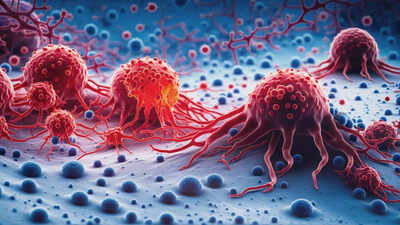Health
Boston Study Links Type 2 Diabetes to Aggressive Breast Cancer

A recent study conducted by researchers at Boston University has established a significant connection between type 2 diabetes and the aggressiveness of breast cancer. The findings, published in Springer Nature, indicate that diabetes alters blood particles known as exosomes, which may compromise the immune response within breast tumors. This alteration potentially facilitates the growth and spread of cancer cells.
The research team, led by Gerald Denis, PhD, from the Chobanian and Avedisian School of Medicine, found that individuals suffering from obesity-driven type 2 diabetes are more likely to experience aggressive forms of breast cancer. This study is particularly pioneering as it is the first to directly connect exosomes from diabetic patients to the suppression of immune activity in human breast tumors.
Understanding the Link Between Diabetes and Cancer
Type 2 diabetes is characterized by the body’s inability to produce sufficient insulin or the ineffective response of cells to insulin, resulting in elevated blood sugar levels. Previous studies have suggested a correlation between type 2 diabetes and an increased risk of breast cancer; however, the underlying mechanisms remained unclear until now.
The BU study reveals that the presence of altered exosomes in the blood of individuals with type 2 diabetes can reprogram immune cells within tumors, rendering them weaker. This immune suppression allows cancer to proliferate more aggressively. “This is the first study to directly link exosomes from people with type 2 diabetes to suppressed immune activity inside human breast tumors,” said Denis in a statement.
Innovative Research Methods
To explore this relationship, the researchers utilized tumor samples from breast cancer patients to cultivate three-dimensional tumor models in the laboratory, known as patient-derived organoids. These organoids retained the original immune cells found in the tumors, allowing for a more accurate representation of tumor-immune interactions.
The team treated these mini tumors with blood exosomes from both diabetic and non-diabetic individuals, alongside samples devoid of cancer. The organoids underwent analysis through single-cell RNA sequencing to assess the impact of the exosomes on immune cells and the tumors themselves. This innovative approach marks a significant advancement in understanding how metabolic diseases like diabetes can influence cancer progression.
Implications for Treatment
The findings of this study hold profound implications for the treatment of breast cancer, particularly for patients with type 2 diabetes. As Denis highlights, “Breast cancer is already challenging to treat, and people with type 2 diabetes have worse outcomes, but clinicians don’t fully understand why. Our study reveals one possible reason: diabetes changes the way the immune system works inside tumors.”
This research could illuminate why traditional treatments, such as immunotherapy, may prove less effective for diabetic patients. By recognizing the unique challenges posed by diabetes, healthcare providers may develop more personalized treatment options for millions of individuals affected by both conditions.
The Global Burden of Diabetes and Cancer
Globally, millions of people are either diabetic or prediabetic, and the intersection of these conditions with cancer represents a serious health challenge. Cancer remains the leading cause of death worldwide, accounting for approximately 10 million deaths in 2020, which is nearly one in six fatalities. The insights gained from this study could play a crucial role in addressing the complexities of cancer treatment in diabetic patients, ultimately improving survival rates and quality of life.
As the medical community continues to unravel the complexities of diabetes and its impact on cancer, this research stands as a testament to the ongoing efforts to enhance patient care and treatment outcomes across the globe.
-

 World4 months ago
World4 months agoSBI Announces QIP Floor Price at ₹811.05 Per Share
-

 Lifestyle4 months ago
Lifestyle4 months agoCept Unveils ₹3.1 Crore Urban Mobility Plan for Sustainable Growth
-

 Science3 months ago
Science3 months agoNew Blood Group Discovered in South Indian Woman at Rotary Centre
-

 World4 months ago
World4 months agoTorrential Rains Cause Flash Flooding in New York and New Jersey
-

 Sports3 months ago
Sports3 months agoBroad Advocates for Bowling Change Ahead of Final Test Against India
-

 Top Stories4 months ago
Top Stories4 months agoKonkani Cultural Organisation to Host Pearl Jubilee in Abu Dhabi
-

 Science4 months ago
Science4 months agoNothing Headphone 1 Review: A Bold Contender in Audio Design
-

 Top Stories4 months ago
Top Stories4 months agoAir India Crash Investigation Highlights Boeing Fuel Switch Concerns
-

 Sports3 months ago
Sports3 months agoCristian Totti Retires at 19: Pressure of Fame Takes Toll
-

 Business4 months ago
Business4 months agoIndian Stock Market Rebounds: Sensex and Nifty Rise After Four-Day Decline
-

 Politics4 months ago
Politics4 months agoAbandoned Doberman Finds New Home After Journey to Prague
-

 Top Stories4 months ago
Top Stories4 months agoPatna Bank Manager Abhishek Varun Found Dead in Well









